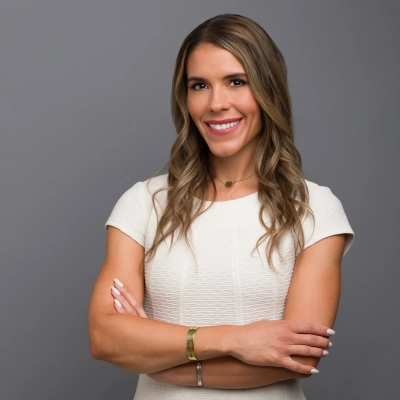Feeling Stuck in Your Career? 16 Ways to Find Clarity and Explore New Opportunities
Career stagnation affects professionals at all levels, but there are many approaches to finding renewed purpose and direction. We asked industry experts to share one piece of advice they would give to someone who is feeling stuck in their current role and unsure of what steps to take next. Here are the actions they suggest taking to gain clarity and explore new opportunities. Learn how to distinguish between temporary comfort zones and genuine career stagnation while aligning future opportunities with your personal values.
- Evaluate Root Causes Before Making Changes
- Distinguish Between Comfort and True Stagnation
- Get Curious About Yourself Through Exploration
- Connect With People Already in Target Roles
- Seek Advice from People in Desired Fields
- Let Curiosity Guide Your Next Steps
- Track Your Motivations and Take Small Steps
- Track Tasks That Put You in Flow
- Invest in Yourself to Create Forward Motion
- Build Diverse Skills Beyond Job Titles
- Pursue What Brings You Joy and Peace
- Identify Which Work Elements Energize You
- Reflect on Energy Sources in Your Work
- Find Mentors Who Recognize Your Potential
- Align Your Values With Career Opportunities
- Network Across Your Organization and Identify Skills
Evaluate Root Causes Before Making Changes
Feeling stuck in your role doesn’t always mean you’re in the wrong place — but it does signal something that needs attention. That sense of restlessness is often a quiet signal that your work no longer aligns with what truly drives you. Instead of trying to push it aside, listen to it. It’s data — and valuable data at that.
First, pause and evaluate the situation. Ask yourself what’s causing your present frustration. Is it the work itself, the environment, your goals, your priorities, or something else entirely? Writing down your thoughts helps you bring problems down to scale and assess whether substantial change is necessary. It will help you act with intention rather than impulse.
Next, get some perspective. Reach out to friends and colleagues in your field to find out if the roadblocks you’re facing are commonplace or unique to your situation. Opening up to others in your field can reveal opportunities for action that were unclear when you were attempting to tackle your problems alone.
Finally, if you decide to make a change, start small. Try a new responsibility, explore a course, or volunteer for something outside your usual responsibilities. Small, practical steps build clarity and momentum, benefiting your future endeavors. Jumping into a new field without testing the waters first can easily set you back rather than propel you forward.

Distinguish Between Comfort and True Stagnation
When you’re feeling stuck in your current role, the first step is to get radically honest with yourself about whether you’re truly stuck or simply comfortable. There’s a significant difference between the two, and recognizing which one applies to you can be transformative.
Ask yourself: Am I being challenged, or am I coasting? Sometimes what feels like being “stuck” is actually the result of having mastered your current responsibilities and settling into a routine that no longer pushes you to grow. If you find yourself completing tasks on autopilot or rarely encountering situations that require you to learn something new, you may have outgrown your role rather than being stuck in it.
The next crucial step is to reconnect with your core strengths and the original motivation that led you down this career path. Think back to when you first chose this role or field. What excited you? What problem did you want to solve? What impact did you hope to make? Write these reasons down and examine them closely. Do they still resonate with who you are today? Our priorities, values, and interests evolve as we grow, and sometimes the path that once felt perfect no longer aligns with the person we’ve become.
This reflection can reveal one of two things: either you’ve drifted away from utilizing your core strengths in your current position, or your strengths and interests have evolved beyond what your current role can accommodate.
If you discover that you’re not leveraging your strengths, look for opportunities within your current role to realign. Can you volunteer for projects that better utilize your abilities? Can you propose new initiatives that excite you? Sometimes a conversation with your manager about taking on different responsibilities can transform your experience without requiring a complete career change. However, if your fundamental motivations have shifted, use that self-knowledge to shape your path forward.
To gain clarity and explore new opportunities, take these concrete actions: conduct informational interviews with people in roles that intrigue you, pursue a small project outside your current responsibilities to test new interests, and invest in learning a skill that bridges where you are to where you want to be.
Remember, feeling stuck isn’t a sign of failure; it’s often a sign that you’re ready for more. The key is determining whether “more” means deepening your impact in your current role or courageously stepping onto a new path altogether.

Geraldine Olea, Thought Leadership Contributor on Tech, Career Strategy & DEI | Founder & Owner, Academy Olea
Get Curious About Yourself Through Exploration
It’s a feeling many professionals know: that sense of being stuck, spinning your wheels in a job that no longer feels right, and not having a clue what to do next. It can be paralyzing. The single most important piece of advice we can offer is this: shift your focus from finding the “perfect next job” to simply getting curious about yourself. Instead of putting pressure on finding an immediate answer, give yourself permission to enter a phase of exploration and learning. The goal isn’t a new title right away; it’s clarity.
This journey begins with an honest personal inventory. Get clear on what energizes versus what drains you at work. Ask yourself what truly matters: is it autonomy, impact, or financial security? A mismatch between your core values and your current role is often the root cause of feeling stuck. Also, take stock of the skills people naturally come to you for, not just what’s on your resume. These are the strengths that will make you exceptional in your next role.
With this self-knowledge, you can explore the outside world in small, manageable ways. Lower the stakes; you’re not applying for jobs, you’re gathering intelligence. Start having “curiosity conversations” by reaching out to people on LinkedIn or in your network who have jobs that pique your interest. Ask them for 15 minutes of their time — not for a job — but to hear about their journey, what a typical day looks like, and what they find most rewarding. You can also test drive new skills by taking a short online course or a small freelance project. These low-risk “micro-experiences” are invaluable for seeing if a new path genuinely excites you.
This journey of self-reflection is the strategic work that turns a series of jobs into a cohesive career narrative. It’s precisely this long-term perspective that exceptional executive search partners help leaders cultivate, ensuring your next move isn’t just a reaction to frustration, but a deliberate step toward a more fulfilling future. You have more control than you think, and it all starts with giving yourself the space to get curious again.

Hanna Koval, Global Talent Acquisition Specialist | Employment Specialist, Haldren
Connect With People Already in Target Roles
Feeling stuck does not have to mean staying stuck. One of the fastest ways to gain clarity is to talk to people who are already where you want to be. Identify the five non-negotiable skills for your target role and then schedule informational interviews to ask how they got there, what they would do differently, and which experiences made the biggest impact.
Next, look at your own career and highlight projects or achievements that could translate to another role. These are your proof points. On LinkedIn, find people with similar backgrounds earlier in their careers and see how they progressed. Reach out with something like: “Your career path is really inspiring. I would love to pick your brain if you have time to provide some mentorship.” This is an informal way to market yourself while learning what it takes to move forward.
By combining these steps, you are not just daydreaming about a new role. You are actively exploring it, building your network, and discovering how your skills can open doors you might not have considered.

Seek Advice from People in Desired Fields
I recommend asking for advice from multiple people in fields that interest you. Doing this helped me tremendously during my own career transition. Conversations with people actually doing the work provided clarity beyond what online research could offer. Having these conversations will help you distinguish between the fantasy of what a role might be like versus the day-to-day reality, giving you practical insights to make informed decisions about your next steps to a transition, especially if you will have to invest in education to make the transition.
The other thing to consider is that it may not be the work that is making you feel stuck. It may be the place you are doing the work that is the issue. Again, speak with people in your existing field before doing the hard work of transitioning careers.

Jeff Altman, Global Job Search Coach, The Big Game Hunter, Inc.
Let Curiosity Guide Your Next Steps
When you’re unsure what’s next, pause before you panic. Instead of asking, “What should I do?” try asking, “What do I want to learn?” Curiosity is a better compass than urgency. Reach out to a few people whose careers genuinely interest you and listen for what resonates. The next step often reveals itself once you stop searching for the perfect plan and start paying attention to what sparks your energy.
Track Your Motivations and Take Small Steps
One advice I’d give to anyone feeling stuck in their role is to start by tracking what motivates vs. drains you for two weeks. It may not sound like much initially, but these patterns tend to reveal whether it’s the company, your daily tasks, or your growth path that’s the issue.
Once you have clarity, take one low-risk step. For instance, if you think you’re not working to your true potential, find a side freelancing project that includes things you enjoy doing, or upskill with an online course. Small steps let you test new directions before making big moves.
Last, always remember: Action gives quicker clarity than overthinking.
Track Tasks That Put You in Flow
Stay attuned to the times you are in a state of flow and heightened energy. Track the tasks you do inside and outside of work for a month and rate them on a scale of 1-5, with 5 being the things you do with ease, excellence and enjoyment. After a month, review your log of activity. The higher scoring responsibilities and interests provide rich insight into your next career move.

Jaclynn Robinson, Founder | Organizational Consultant and Executive Coach, Nine Muses Consulting, LLC
Invest in Yourself to Create Forward Motion
Don’t be afraid to invest in yourself. That’s the advice I give anyone who feels stuck.
It’s easy to get caught up in routines or wait for something external to change — a promotion, a new project, a different environment — but growth almost always starts internally. Sometimes that means taking a course, finding a mentor, or carving out time to explore an idea that excites you. Other times it’s simply giving yourself permission to step back and ask what you actually want out of the next chapter.
When you make the effort to invest in yourself — time, money, or focus — you create motion. And motion builds clarity. You start to see what energizes you, what drains you, and where your skills can make a bigger impact.
I’ve learned that the best opportunities usually appear after you’ve already started betting on yourself. So don’t wait for the right moment — create it — by taking intentional steps forward.
Build Diverse Skills Beyond Job Titles
I would advise anyone feeling stuck in their role to shift focus from chasing job titles to intentionally building a diverse skill set. This approach will make you more adaptable to market changes while helping you discover talents you might not know you have. By stepping outside your comfort zone to develop new competencies, you’ll not only gain clarity about possible career paths but also open yourself to opportunities you may have overlooked. This strategy builds confidence and creates a foundation for sustainable career growth rather than just vertical advancement.
Pursue What Brings You Joy and Peace
My advice? Figure out what brings you peace and joy, and then go after that. Life is too short to stay stuck in a role that drains you or doesn’t light a fire within you. For me, reading and design are what bring me peace, joy, and energy, and that’s what led me to shift my business to offering self-publishing services.
If you’re feeling unsure about your next steps, start by paying attention to what naturally excites you, what makes you feel alive, and where your gifts lie. Pray about it, reflect, and even journal your thoughts. Asking God for guidance can provide clarity when the path feels foggy. Then, take small, intentional steps toward exploring those areas. Try a course, volunteer in that space, or talk to people who are already doing what interests you.
Remember, it doesn’t have to be an all-or-nothing leap at first. Faithful, consistent steps toward your joy and purpose often reveal the opportunities and direction God has for you.
Identify Which Work Elements Energize You
When you’re feeling stuck, resist the urge to start looking for a new job or a new challenge. Instead, pause to reflect why you’re feeling that way, and record which pieces of your work energize you, as opposed to which pieces drain your energies.
Next, strike up a conversation with individuals who are already doing what you are interested in doing. Converse, really, and find out more about a job through a face-to-face discussion than from any job posting.
Reflect on Energy Sources in Your Work
Everyone can feel stuck in their role at some point. I also feel that way sometimes, and it’s not easy to overcome those thoughts. But I can suggest pausing and being honest about the reason why you’re feeling that way. Sometimes we think it’s about our job, but it’s not all because of that. It’s sometimes the lack of challenge, growth, and connection.
When I see someone struggling with the same feeling, I encourage them to take some time to reflect on what parts of their work are making them feel stuck and what’s giving them energy to continue. I do that on my own as well, and I often resolve the issues by weighing things that discourage me against what I’m excited about.
Once you’re clear about what you want to do, you can start taking small steps towards growth. That includes asking for new responsibilities, taking up courses, or even shadowing someone in a different department. When people see your curiosity and your willingness to learn new things, new opportunities often follow. Feeling stuck is normal, so don’t be afraid to try new things that will teach you something in life.

Find Mentors Who Recognize Your Potential
When feeling stuck in your current role, I would recommend seeking out mentorship relationships within your organization or industry. In my own career, I found that connecting with a mentor helped me transition from a Senior Engineering Manager to roles in Partner GTM and Finance that I hadn’t previously considered. A good mentor can provide perspective on your strengths that you might not recognize yourself and can help identify growth opportunities that align with your capabilities and interests.
Align Your Values With Career Opportunities
It is common to experience a sense of being stuck in your career. The first step is admitting to yourself that this is the situation. When you acknowledge it, you can work on moving forward. First, think about your values and your direction. Identify any values that are really important to you, think about what you enjoy doing, and think about what you do not enjoy doing. This process will give you a clear sense to clarify if your role is still a fit or perhaps you need to start thinking about exploring other options.
Determine your strengths. Write a list of natural skills that come easy to you and that you like. Not only does it help you with self-awareness, you are able to aim your efforts at taking advantage of and enhancing some of your current strengths. Talk to people. This can be a coworker, mentor, or even people in positions you admire. Their past experiences may create new ideas and options for you on your journey.
Think about the possibility of learning new skills to support you in what you need or to add to your career development. This could be anything from professional development courses, to small projects or assignments to even trying a new project for your leisure time; all of the competencies you build may help build your confidence for your next career opportunity. Don’t be afraid to ask for help in the process.
Once you work through the steps mentioned above, you will discover clarity. You will even discover new future options and opportunities, while moving forward with confidence and direction.

Network Across Your Organization and Identify Skills
When feeling stuck in your current role, I recommend proactively networking with colleagues across your organization to learn about their career paths and how they navigated similar challenges. Taking the initiative to identify your skill gaps through honest self-assessment and pursuing targeted training can provide clarity on potential growth directions. Additionally, maintaining professional connections both inside and outside your company opens doors to opportunities you might not discover otherwise. If you have a good relationship with management, express what areas you’d like to pursue in an open and honest conversation. You never know where cross-training and additional responsibilities may be available alongside your current role. If you are able to perform multiple functions, it can help expand and diversify your role as well as offer additional flexibility and coverage for the business.

Colton De Vos, Marketing Specialist, Resolute Technology Solutions
Related Articles























